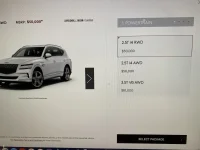The problem with the
Aviator is that it's still regarded as an uptrim version of the Ford Explorer (which it basically is), and not everyone wants an Explorer. Neither the
Telluride or
Palisade are much cheaper than a comparably-equipped Explorer, yet they also sell quite well.
Unlike before, think
Lincoln has done a nice job differentiating the
Aviator from the Explorer.
If anything, the Explorer being too chinzy compared to its direct competitors (like the
Telluride) shows how great the disparity is btwn the Ford and
Lincoln variants.
Otoh, the Tiguan and Audi Q3 are based on the same platform and the Tiguan is pretty nice on the inside, making the 2 closer competitors within the VAG family (personally like the looks of the Tiguan better).
There will be buyers who prefer the looks and interior of the GV80 and vice versa.
There will be buyers who would rather purchase domestic and there are buyers who wouldn't touch a domestic.
But as stated previously, think that the 3rd row being a good bit more cramped than the
Aviator will make the decision for a good # of buyers who like both.
The only rationale that I can come up w/ as to why Genesis chose to chop off as much from the WB as they did (compared to the current G80) is that they are positioning the GV80 more for global markets - where other markets don't need or want
American-sized vehicles.
But still, think they went a little too far.
At the least, the GV80 should have offered as much space as the X5 and GLE (which are popular around the world), if not a tad bit more, but seems like it offers a tad bit less.
As for the Acura MDX- I've been browsing those forums for a while and many, many of the owners seem to be contemplating the GV80 unphased by the top-trim price, not only because the MDX has been horrendously unreliable, but because they also expect the new MDX to be priced at or even higher than the GV80. People tend to forget that the reason the Lexus or Acura are priced cheaper has a lot to do with the fact that they're quite old designs (RX is from 2016, MDX from 2014). Look at any of Lexus's newest offerings and you can see they are all sitting not far below the same price as the German competition- even the once cheap Lexus ES can be now equipped to the same price (~55k) as a Genesis G80 AWD Ultimate 3.8. The new Acura RDX is only priced 2 grand below the X3.
A big reason why the FWD-based models have been cheaper is b/c that's what the market dictates.
Case in point, Acura thinking that they can charge a premium for the RLX (thinking that it was more a competitor against the likes of the 5 Series and E Class) - the RLX starting at around
$55k.
Meanwhile the
Cadillac XTS starts around
$47k and the Conti at
$46k.
No surprise that sales of the RLX has been an unmitigated disaster for Acura.
At least all 3 of them played in the midsize lux price segment.
Lexus, w/ their FWD offering (based on full-size platform) has always been priced at the compact segment level; the ES now starting at
$40k.
The BMW 330 starts at
$41k and the C Class at
$41.4k.
Even when Lexus switched the platform for the ES from the Camry to the Avalon, they were careful to not raise the price too much as they knew that they would lose considerable sales volume if they did so (plus, they had the GS servicing that mid-segment price-range).
Now, w/ the demise of the GS seemingly imminent, the next ES (now serving as a substitute for the GS) will likely go up in price some, but it won't be to the extent of where the RLX is priced.
The starting price of the new RDX isn't that much higher than the aging NX.
RDX - $38k
NX - $37k
X3 - $42k
GLC - $42.5k
So the price diff. btwn the RDX and the RWD Germans is around
$4-4.5k, but once you compare comparably equipped vehicles, that price disparity increases.
The starting price of the is a few grand lower than that of the RX-L, but can't see the price of the next MDX being much higher than for the Lexus (the price increase will be reflected in a nicer interior and greater emphasis on SH-AWD).
MDX - $44.5k
RX -L - $47.3k







